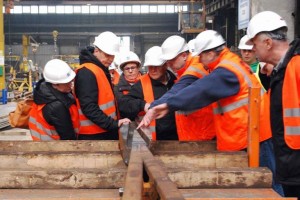Essential railroad turnouts
Kolejowe Zakłady Nawierzchniowe (KZN) “Bieżanów” and the Centrum Diagnostyki PKP PLK have completed another cycle of technical workshops on railroad turnouts.
 The investment model applied on Polish railroads for several years has resulted in the decrease of the frequency and intensity of direct contacts between the manufacturers of the key elements of the railroad infrastructure, and the railway management authority employees who are directly responsible for the daily use of those elements. Both the technical documentation and the operational guidelines rarely make their way to the railway maintenance departments, being frequently held up at the contractor or in PLK’s departments responsible for the investments. It is also one of the reasons for the growing gap in technical knowledge among the railway management personnel. In order to attempt to reduce this gap, PKP PLK Diagnostic Centre organised the workshops. “The immediate reason was to provide a reminder of the model of supervision over the quality of turnout manufacturing,” points out Ireneusz Jasiński, Deputy Head of PKP PLK Diagnostic Centre. “It was also important to familiarise the participants with the modern turnout manufacturing process, as well as to provide opportunity for an exchange of know-how between the employees of the leading manufacturer of the key railroad surface elements, and the PKP PLK personnel responsible for the daily operation of those elements.”
The investment model applied on Polish railroads for several years has resulted in the decrease of the frequency and intensity of direct contacts between the manufacturers of the key elements of the railroad infrastructure, and the railway management authority employees who are directly responsible for the daily use of those elements. Both the technical documentation and the operational guidelines rarely make their way to the railway maintenance departments, being frequently held up at the contractor or in PLK’s departments responsible for the investments. It is also one of the reasons for the growing gap in technical knowledge among the railway management personnel. In order to attempt to reduce this gap, PKP PLK Diagnostic Centre organised the workshops. “The immediate reason was to provide a reminder of the model of supervision over the quality of turnout manufacturing,” points out Ireneusz Jasiński, Deputy Head of PKP PLK Diagnostic Centre. “It was also important to familiarise the participants with the modern turnout manufacturing process, as well as to provide opportunity for an exchange of know-how between the employees of the leading manufacturer of the key railroad surface elements, and the PKP PLK personnel responsible for the daily operation of those elements.”
For KZN “Bieżanów”, the main objective of the meetings was to share with the personnel of the Polish railway management authority the technical expertise is related to the latest trends in materials and structural solutions in the railroad turnouts industry. Reaching the people dealing with the turnouts on daily basis on the so-called “railroad grounds” with this know-how is crucial for maintaining high railroad traffic safety standards and ensuring the correct operation of those products. “They must know the characteristics of specific structural solutions, why and in what environment are they applied, and how to design the maintenance process in order to maximise their potential and ensure long-term durability and reliability,” says Jacek Paś, Board Member and Technology & Development Director at KZN “Bieżanów”. “For any responsible manufacturer, obtaning reliable and experience-driven feedback on the product is essential for further improvement and matching the clients’ needs, and more efficient building of technological advantage,” Mr. Paś adds.
The workshop programme was designed with those guidelines in mind. The workshops consisted in theoretical segment and demonstration. One of the key elements of the theoretical segment was the revision of PKP PLK’s internal procedures related to acceptances and the maintenance process; also, the issues of turnout operation were discussed in detail from the perspective of the metallic materials used in the manufacture; the participants had the opportunity to take a closer look at the prototype railroda turnouts developed by KZN “Bieżanów”. During the theoretical segment, the participants were shown the manufacturer’s new offer on turnout maintenance. “Since several weeks ago, each turnout that we sell comes with the first trim of the metal flows, which is crucial for the durability of the structure. In turnout structures made with high-manganese cast steel, bainitic cast steel and other materials applied in our manufacturing process, it is necessary to periodically remove such material deformations. We have highly qualified personnel and specialised equipment at our disposal, and we would like to be able to contact the users more frequently, assisting the railway management authorities in their daily operations,” emphasises Dariusz Prasiel, Maintenance Department Manager at KZN.
The demonstration organised on the production floor in Bieżanów included a two-stage technical acceptance process of the railroad turnouts, i.e. the internal acceptance procedure consisting in the verification of the product by the Quality Control Department of KZN “Bieżanów”. The internal procedure was followed by the external acceptance procedure by the officer of PKP PLK Diagnostic Centre. The participants had the opportunity to observe the manufacturing process of a high-quality turnout and learn which tools, materials and processes are required for the process.
“The technical dialogue between the manufacturer and the representatives of the end user, taking place in a realistic setting, makes it possible to better understand the mutual expectations and to improve our products. It also provides the opportunity to find an application area for brand new solutions that will ensure our competitive edge,” says Remigiusz Tytuła, Marketing & PR Manager at KZN “Bieżanów”.
In the workshop cycle, a total of three meetings took place between December 2015 and March 2016. Nearly one hundred employees represented PKP PLK, including the personnel from the Diagnostic Centre, Rail Lines Office, Railroad Operations Office, as well as employees of the Railway Lines Plants in Częstochowa, Kielce, Krakow, Lublin, Nowy Sącz, Opole, Rzeszów, Skarżysko Kamienna, Sosnowiec, Tarnowskie Góry, Wałbrzych, Wrocław and Zielona Góra.



